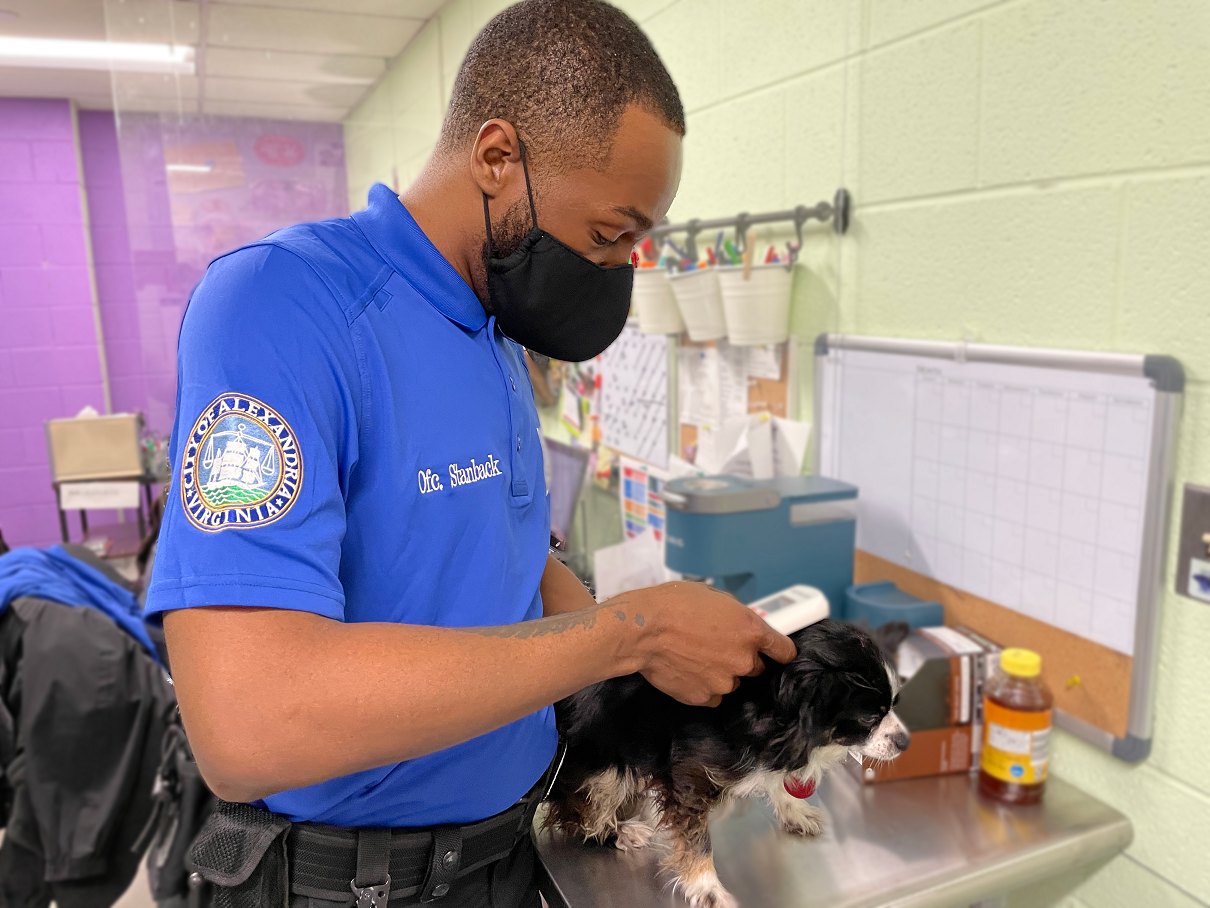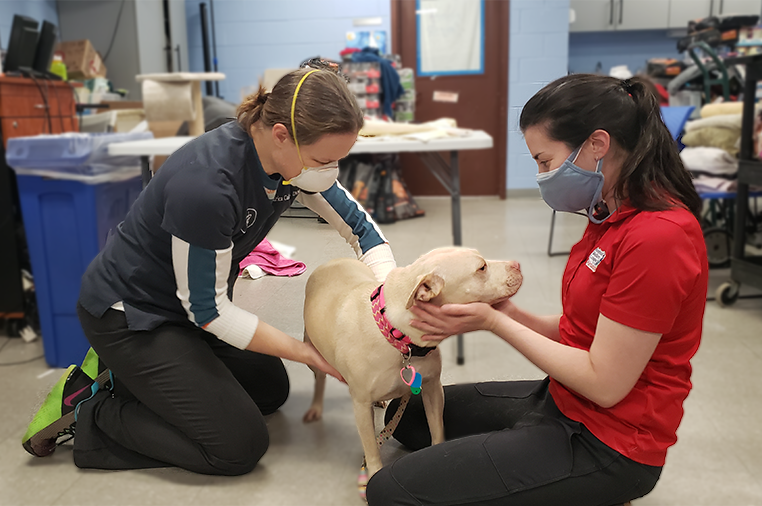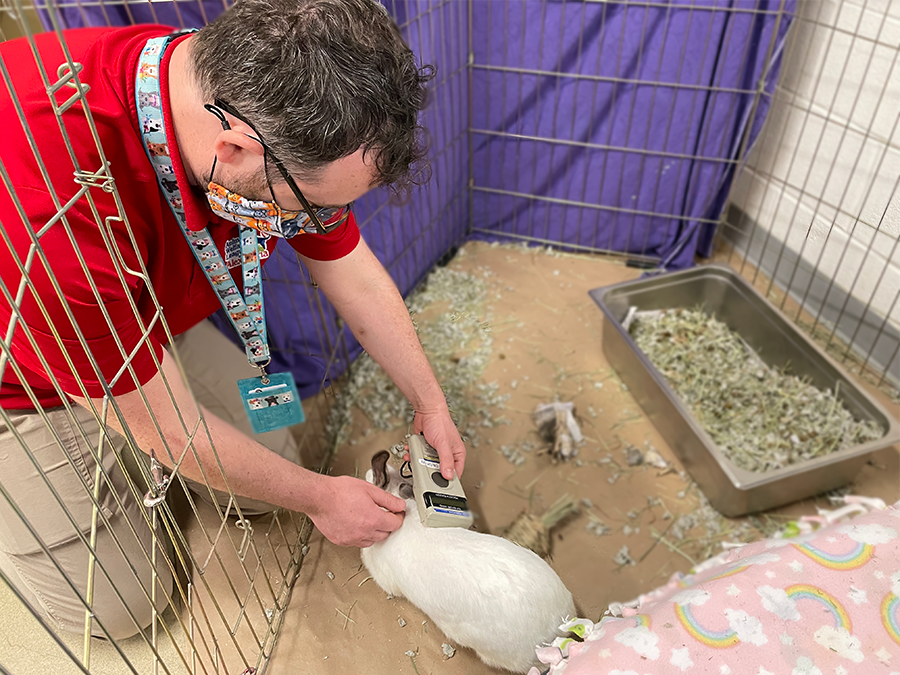With the wave of a wand, Spot can go from being a lost animal to a pet who is returning home to his family. It’s not magic. It’s microchipping.
As a pet owner, you have probably heard of microchips, even if you aren’t familiar with how helpful they can be. Pet owners often don’t consider their pets’ microchips until a pet goes missing. Hopefully, your best friend will never slip out of their harness or dart out the front door, but if they do, a microchip — in addition to a collar with identification — is a simple way to help reconnect pets with their families. Now the Animal Welfare League of Alexandria (AWLA) is making it easier than ever for pet owners to have their pets microchipped.
 “We want to make sure that every pet owner has access to the benefits a microchip provides so their pet can be reunited with their family in the event they become lost,” says AWLA Director of Community Programs Joanna Fortin. “We are proud to offer monthly microchip and vaccination clinics to our community at an affordable rate to ensure that financial barriers don’t keep lost pets from making their way back home.”
“We want to make sure that every pet owner has access to the benefits a microchip provides so their pet can be reunited with their family in the event they become lost,” says AWLA Director of Community Programs Joanna Fortin. “We are proud to offer monthly microchip and vaccination clinics to our community at an affordable rate to ensure that financial barriers don’t keep lost pets from making their way back home.”
Ofc. Stanback of Alexandria’s Animal Services scans a dog’s microchip.
Microchipping can be one of the best and most universal ways of connecting pets with their families. A microchip is a glass-enclosed chip as small as a grain of rice that is embedded under your pet’s skin. When scanned, the microchip it reveals a unique number, that, when looked up, can provide contact information for the owner.
Depending on how you met your best friend, they might already have a microchip. Dogs, cats and rabbits adopted from the AWLA all have microchips, but pet owners still need to register those chips with their own information, and make sure to keep their contact information up to date. More resources for pet owners include a universal microchip lookup tool at PetMicrochipLookup.org and a free registry database at FoundAnimals.org. Microchips will sometimes have a one-time cost associated with registering, but after that, pet owners only need to keep their contact, address and emergency information up to date.
 Now you ask yourself: Does my pet have a microchip? Animal hospitals, animal shelters or rescue organizations and even many pet supply stores have microchip scanners, so if you didn’t receive microchip information with your pet, you can easily find their chip number. The AWLA recommends that at annual veterinary check-ups, you have your pet scanned to make sure the chip is still functioning properly.
Now you ask yourself: Does my pet have a microchip? Animal hospitals, animal shelters or rescue organizations and even many pet supply stores have microchip scanners, so if you didn’t receive microchip information with your pet, you can easily find their chip number. The AWLA recommends that at annual veterinary check-ups, you have your pet scanned to make sure the chip is still functioning properly.
A dog visits with AWLA staff during a Low-Cost Rabies, Distemper and Microchip Clinic.
If your pet doesn’t have a microchip, the AWLA offers an easy and low-cost solution. On the first Wednesday of each month, you’ll find the shelter’s parking lot full and dogs on leashes and cats in carriers being transported to and from the building by AWLA volunteers. These drive-up vaccination and microchip clinics are the AWLA’s solution to providing rabies and distemper vaccines to pets in the community by appointment, while keeping everyone at a safe physical distance.
 “Since we’ve begun offering microchipping at our monthly vaccine clinics,” Fortin says, “we’ve seen an enormous amount of interest in this service. Alexandrians love their pets and are very grateful for the added safety net a registered microchip offers.”
“Since we’ve begun offering microchipping at our monthly vaccine clinics,” Fortin says, “we’ve seen an enormous amount of interest in this service. Alexandrians love their pets and are very grateful for the added safety net a registered microchip offers.”
Before heading home, each adopted animal’s microchip is scanned at the AWLA.
If microchips seem like a simple safeguard for you pet, it’s because they are. By keeping them registered, up to date and checked annually, pet owners can have peace of mind knowing that if their best friend goes missing, with a quick scan, they’ll be able to find their way home.
The AWLA hosts Low-Cost Rabies, Distemper and Microchip Clinics on the first Wednesday of every month at their location at 4101 Eisenhower Ave. Learn more and schedule your appointment at AlexandriaAnimals.org/RabiesClinic.
This story was originally printed in Alexandria Living Magazine on March 26.
[cmsms_divider width=”long” height=”1″ style=”solid” position=”center” margin_top=”50″ margin_bottom=”50″ animation_delay=”0″]Get the latest animal news right to your inbox!

